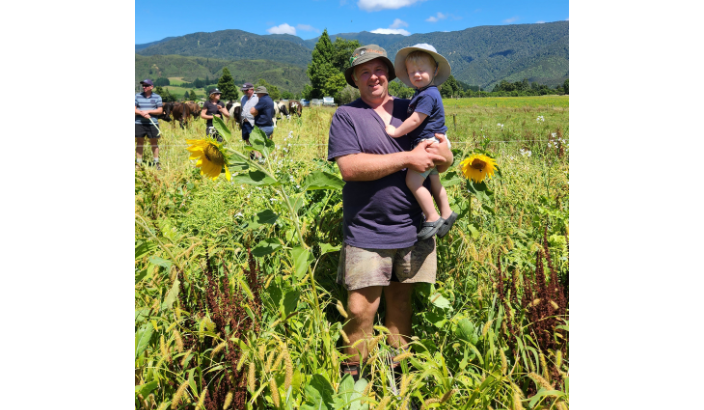Makes sense to be low input and more resilient.


Mark Tubman and two-year-old Oakley standing in their summer crop. Photo: Esther Tubman.
DairyNZ held an event on 8th February with Mark & Esther Tubman who are Contract milkers at Purmahoi in Golden Bay for John and Anne Freeman. They currently milk 350 cows on the 150-ha platform with heifers reared and cows wintered on support blocks. For many years the business has focused on low-cost production combined with a low environmental footprint.
Mark formerly spent four years working on a high input system reliant on nitrogen which also had high levels of debt before working in Golden Bay.
He says, “it makes more sense to have an all-grass system utilising regenerative pastures to help reduce reliance on nitrogen use.”
Over the past 12mths following on the practice of John and Anne, they’ve only used 31kg per hectare of nitrogen. They’ve also been using a crop of regenerative summer crop mix which includes sun flowers and other species, The summer grass mix was direct drilled in October. This kind of mix is also good for the soil and provides summer drought resistance. The idea being that grass species with longer root systems will also help to withstand dry conditions. John and Anne have been using the biological Kinsey Albrecht, fertiliser and a spring and autumn round of fish fertilisers for the past eight years also.
Comparing a three-hectare conventional pasture with the three hectares of regenerative pasture Mark has found they are doing a 30–50-day rotation between grazing on his summer pasture mix and the overnight feed required is only 1.5 hectares, they’re getting an extra nights feed whilst maintaining and improving production. So far this season they are up 4%.
Up 18% in January and so far for February they are up 17%. With the past two summers being wet he’s been unable to gauge just how beneficial the summer pasture may have been. However, the red clover and other nitrogen fixing species not only help reduce nitrogen use but will be good for the soil he believes. Mark commented that; Giant Buttercup which is a big problem appears to get shaded out.
Local DairyNZ Extension Partner Mark Shadwick commented that farmers attending the event seemed to be impressed by the multi species sward that was established 3 years ago and is currently being grazed on a longer round than the standard ryegrass paddocks, He added that recent scientific research from Europe has highlighted that the more diverse pastures are more drought resistant.
